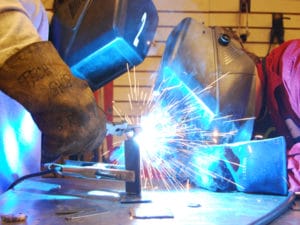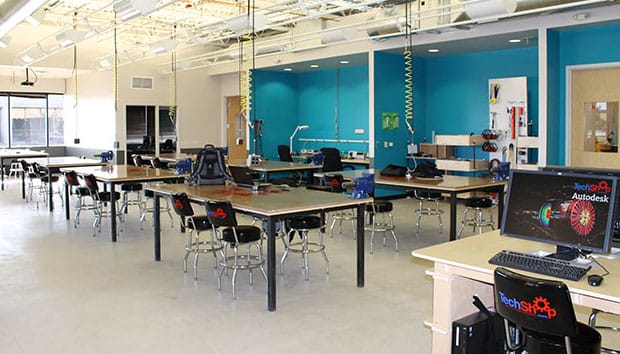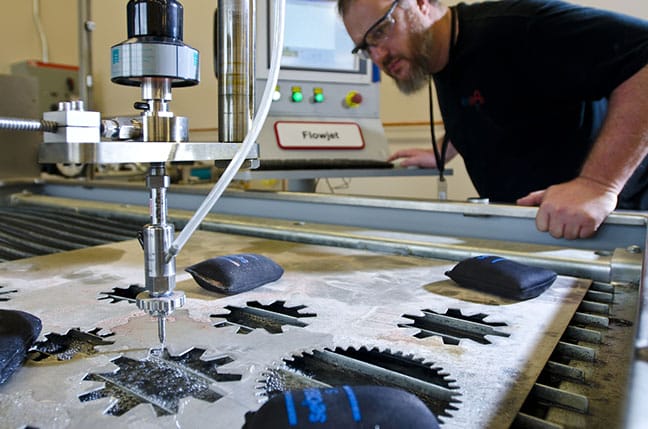Mark Hatch, TechShop CEO, Re-Engineers Innovation

For a $150 monthly membership fee, Mark Hatch’s business can literally help you build your dreams.
In 2007, the Drucker School of Management alumnus (MBA, 1995) joined Mythbusters science advisor and robot builder Jim Newton as a co-founder of TechShop, a member-supported, do-it-yourself fabrication studio that had opened the prior year and was equipped with the latest industrial tools and design software. Currently boasting eight US locations, TechShop’s 6,000 members have helped make it the world’s leading “Makerspace”—a laboratory for tinkerers, hobbyists, artists, entrepreneurs, and inventors who have creative ideas but lack the tools and training to build, or make, them.
In his book, 2013’s The Maker Movement Manifesto, Hatch spearheads the idea that humans are made to make. Credited with popularizing the so-called “Maker Movement”—he cites both the perspectives of evolutionary biology (an opposable thumb that enables tool use and making) and religious traditions (God as the original Maker) to bolster the concept.

“Access to tools is fundamental to what it means to be human,” Hatch said. “Making things is fundamental to what it means to be human.”
Hatch, who will discuss his ideas and insight as the keynote speaker for the Drucker School’s Entrepreneurs Day on July 18, credits Peter Drucker’s management principles for some of his entrepreneurial inspiration.
Drucker taught to “focus on your strengths,” he said. “You’ve got to focus on what you’re really good at. It’s really transformative when you get to a place where you can operate in an area of strength and how it will turbo-charge your career.”
So far, TechShop “Makerspaces” have birthed a range of ideas, from innovative products that were quickly introduced to the marketplace, to devices that have saved human lives.
They include:
• Square Reader: This small tile-like device connects to smartphones and allows small businesses to bypass traditional bank methods of processing credit and debit card transactions.
• Embrace: This inexpensive warming blanket keeps premature babies in developing countries warm until they receive medical attention. Embrace is credited with helping to save 150,000 babies’ lives, according to Hatch.
• DODOcase: These custom cases for Apple products and other portable devices are made using bookbinding techniques and artisanal materials such as bamboo. President Barrack Obama used one—and praised it—for his iPad.

“That’s the power,” Hatch said. “Not only can people come in and learn how to make things — like greeting cards — and etch wine glasses, but some people have actually come in and changed the world.”
TechShops house space for metalwork, woodwork, painting, electronics, and textiles. They are also equipped with computer terminals and software as well as laser and water jet cutters, 3D printers, and vacuum forming machines.
“If you can conceive it today it’s not outside the realm of possibility to have a prototype running tonight,” he said.
Members can pay for classes to learn how to operate the equipment. But just as important is the community Hatch’s facilities nurture. TechShop staff and fellow makers are on hand to help each other with knowledge and expertise.
This egalitarian access to brainpower and equipment enables novices and experts to prototype ideas and test concepts while significantly saving on development costs and time.
“It’s fundamentally changed the way new products should be developed,” he said.

Hatch cites the experience of DODOcase founder Patrick Buckley, who learned how to make an iPad case and rapidly launched a company based on it.
“He didn’t take three-month class on how to do design and manufacturing and sit in a room with white-haired guys evaluating whether or not they thought his product was worthy enough to invest in,” Hatch said. “He learned all the skills he needed, launched a company, and had $1 million in sales in 90 days.”
Hatch, who previously worked as director of global business development for Avery Dennison and as director of computer services for Kinko’s (now FedEx Office), said his plans call for establishing more “Makerspaces” across the country. TechShops in Los Angeles and St. Louis are in the planning stage.
“I call it The Maker Movement Manifesto because I truly believe we are in the middle of a revolution,” he said. “Maybe it’s an industrial renaissance. It’s leveraging a whole bunch of existing trends, but it’s truly revolutionary.”
To watch Mark Hatch speaking at the 2014 MakerCon Bay Area, click on the video below: